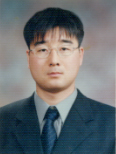
- Position
- Professor
- Tel
- 82-62-530-2166
- Fax
- 82-62-530-2169
- dkkim2@jnu.ac.kr
- Nationality
- Korean
Contents
| Affiliation |
Host-Directed Antiviral Research Center, Department of Molecular Biotechnology, Chonnam National University |
|---|---|
| Education |
- 2006. 3. – 2009. 8.: Ph.D. in Molecular Endocrinology, Chonnam National University, South Korea. - 2003. 3. – 2005. 2.: M.S. in Molecular Biology, College of Natural Science, Daegu University, South Korea. - 1996. 3. – 2003. 2.: Bachelor in Genetic Engineering, College of Natural Science, Daegu University, South Korea. |
| Major Experience |
2022- present: Guest Editor, Antioxidants, Special Issue Title: Redox Signaling in Liver Diseases |
| Recent Main Scientific Publication |
1. Sadasivam S, et al. 2023. Emerging Role of SMILE in Liver Metabolism. Int J Mol Sci. 24: 2907-21. (Corresponding author, IF=5.6) 2. Kim BE, et al. 2022. Nuclear receptor HR3 mediates transcriptional regulation of chitin metabolic genes during molting in Tribolium castaneum. Pest Manag Sci. 78: 4377-87. (Corresponding author, IF=4.1) 3. Choi B, et al. 2022. Nuclear receptor estrogen-related receptor modulates antimicrobial peptide expression for host innate immunity in Tribolium castaneum. Insect Biochem Mol Biol. 148: 103816-27. (Corresponding author, IF=3.8) 4. Sadasivam S, et al. 2022. Oxidative Stress, Geno,ic Integrity, and Liver Diseases. Molelcules. 27: 3159-77. (Corresponding author, IF=4.6) 5. Park WR, et al. 2022. Melatonin Regulates Iron Homeostasis by Inducing Hepcidin Expression in Hepatocytes. Int J Mol Sci. 23: 3593-605. (Corresponding author, IF=5.6) 6. Kim IY, et al. 2022. Nuclear receptor HR96 up-regulates cytochrome P450 for insecticide detoxification in Tribolium castaneum. Int J Mol Sci. 78: 230-39. (Corresponding author, IF=4.1) 7. Kim YJ, et al. 2021. Epigallocatechin-2-Gallate Suppresses BMP-6-Mediated SMAD1/5/8 Transactivation of Hepcidin Gene by Inducing SMILE in Hepatocytes. Antioxidants. 10: 1590-1605. (Corresponding author, IF=7.0) |
| Research Interests |
Molecular endocrinology: Metallodrugs such as metal nutrients and metal compounds can play an important role in the prevention and treatment of viral infection. At present, two methods are used to discover potential metal-based drugs for viral infection: repurposing existing medications and developing new drugs. These metallodrugs might directly inhibit virus replication, prevent viruses from entering cells, or inhibit the activity of critical enzymes in the process of virus replication. Furthermore, the combination of antiviral drugs and metals can be more effective. Thus, my research interests lie in the homeostatic control of metal metabolism in response to viral infection, and also in molecular mechanisms that show how secretory proteins including hormones, enzymes, toxins, and antiviral peptides, involve metal homeostasis and viral infections. These interests provide new insights that the control of metal metabolism and secretory proteins would be a novel host-directed therapeutic approach to prevent and treat viral infections. |